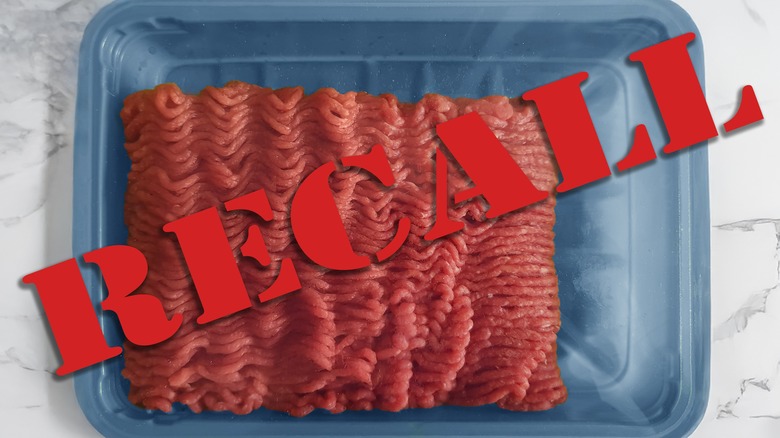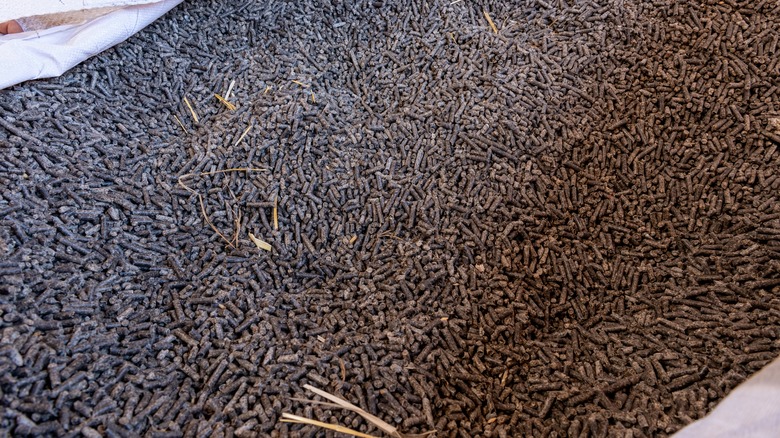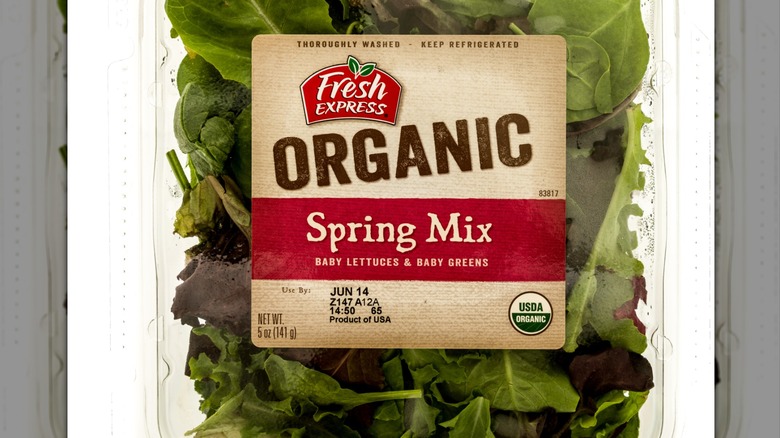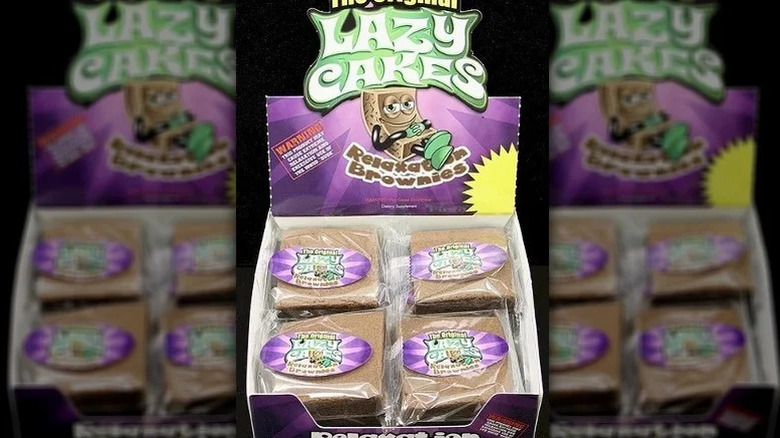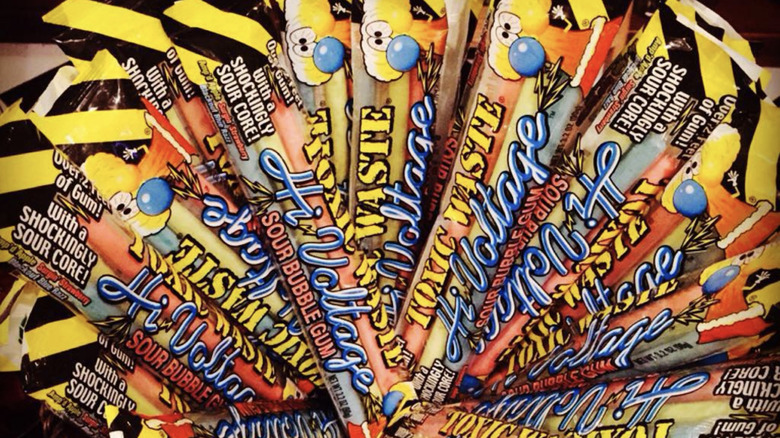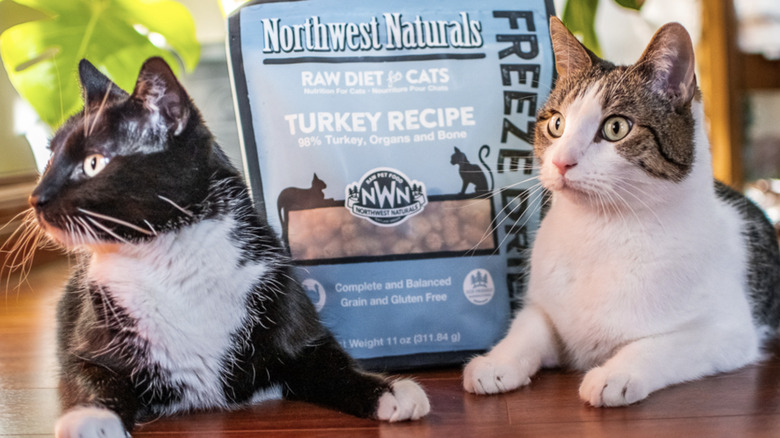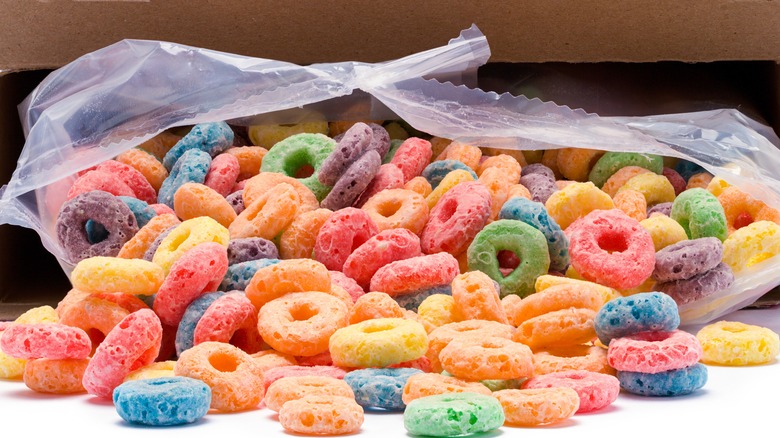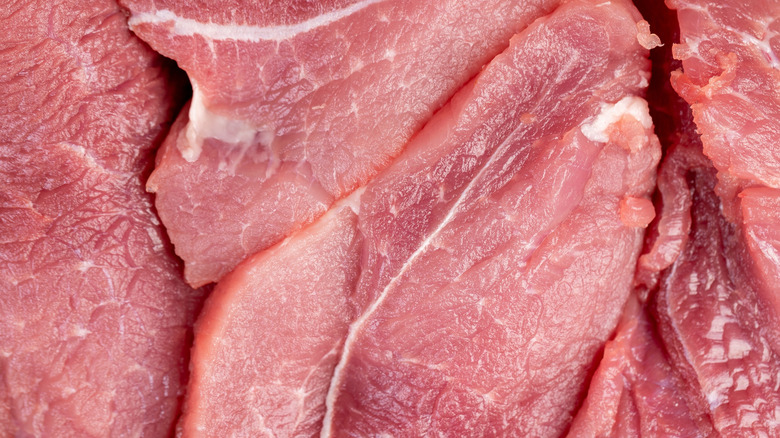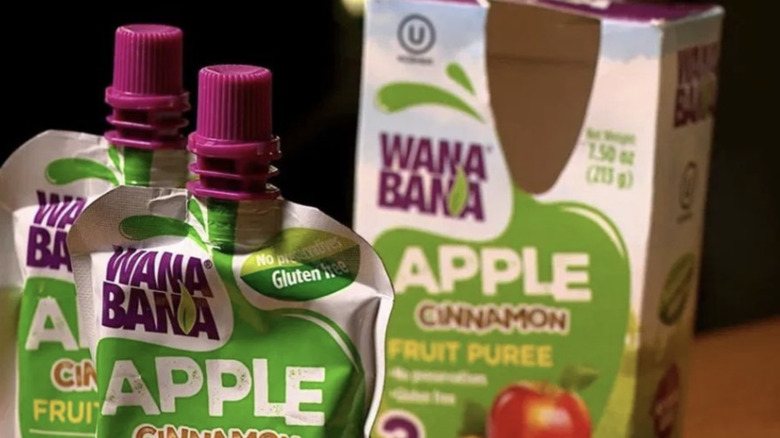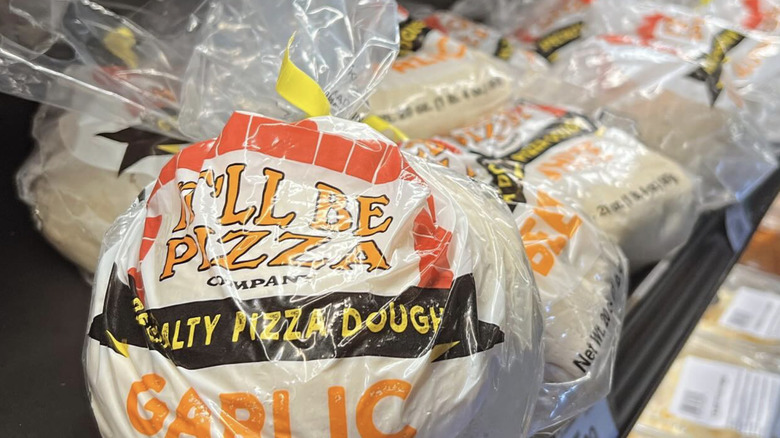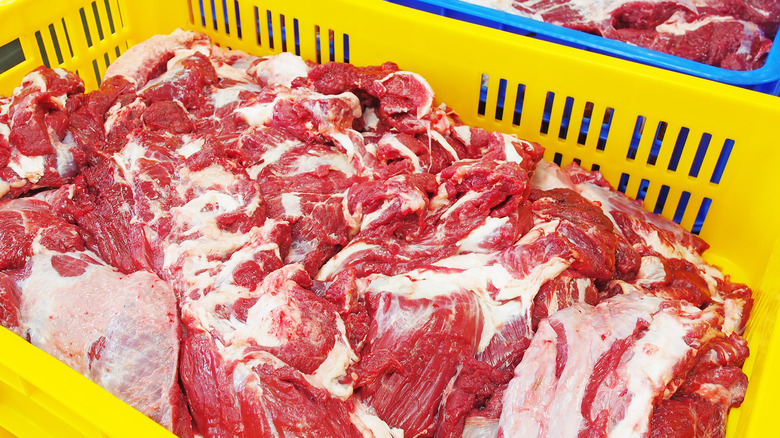The Strangest Food Recalls In US History
Food production is a multi-billion dollar industry that relies on countless factories and workers to manufacture the goods we consume. One false move at a food processing facility can result in a federally-mandated food recall that endangers the general public and creates huge financial losses for companies. Recalls related to food borne bacteria get a lot of media attention because of the obvious health risks they pose, but the food recalls on this list rattled U.S. consumers for another reason — they were especially strange.
Remember that part about one false move at the factory? Blunders during the food processing stage are why recalls happen in the first place. Poor employee hygiene and unsanitary environments — be it a factory, a farm, or sometimes the soil or water — are typically the cause for food borne pathogens making their way into commercial goods. However, it seems to be people's conduct at the factory that created the strangest recalls ever.
What makes a recall strange? It's all circumstantial. Unlikely cross contaminations, assembly line snafus, plus a whole lot of human error are the reasons behind some of the weirdest food recalls that have affected the U.S. commercial food market. Let's take a look at some of the wacky mishaps that had the general public scratching their heads.
Golf ball pieces in McCain Hash Browns (2017)
Bits of plastic or metal making their way onto food processing assembly lines is gross, but it happens, and has been the culprit behind lots of U.S. recalls. What lurked beneath McCain's frozen hash browns in 2017, however, was more specific and far more weird: there were pieces of golf balls mixed in with the potatoes. Once McCain's mishap was discovered, the company was forced to recall all of the hash brown products that were below par.
McCain Foods USA, Inc. announced the hash brown recall on April 21, 2017. The products affected were two-pound bags of frozen Southern Style Hash Browns sold under brand names Roundy's and Harris Teeter. The Roundy's hash browns were sold at Mariano's, Metro Market, and Pick 'n Save grocery stores in Illinois and Wisconsin. Harris Teeter's store brand hash browns were sold in Delaware, Florida, Georgia, Maryland, North Carolina, South Carolina, Virginia, and Washington D.C. All of these grocery stores are owned by Kroger.
No consumer injuries were reported after the Kroger-associated recalls were announced, yet the problem didn't end with Kroger-owned stores. Four days later, McCain expanded the recall to include Wegmans store brand O'Brien Hash Browns. McCain's explanation for the incident was also pretty strange. The company stated that despite its best efforts to maintain its "stringent" standards, hard plastic and rubber pieces from golf balls were "inadvertently harvested" alongside the chopped-up potatoes used to make the hash browns. Harvesting golf balls? Whatever you say, McCain.
Western Sugar beet animal feed contaminated by a corpse (2014)
Most of us overlook how much goes into the packages of beef sold at supermarkets nationwide. In 2014, a little too much may have gone in, and the recall that followed was one of the creepiest in U.S. history. It all started on January 4, 2014, when tragedy struck at Western Sugar Cooperative's sugar and molasses manufacturing facility in Lovell, Wyoming. A 28-year-old employee named Anfesa Galaktionoff was killed that day, after falling inside industrial-grade equipment used to wash and transport sugar beets.
Although Western Sugar shut down the plant to recover Galaktionoff's body, the factory still produced pulp, pellets, and tailings from beets that were inside the machinery when she died. These beet byproducts were sold to feedlots in Wyoming and Montana and fed to cattle that would become commercial beef. Western Sugar knew this egregious oversight couldn't be concealed for long, so the company voluntarily recalled all of the adulterated animal feed.
This disturbing recall was closely monitored by the FDA and Departments of Agriculture in Wyoming and Montana. No sugar, molasses, or other beet products intended for human consumption left Western Sugar's facility. As for the cattle that maybe ate human remains? The U.S. Department of Agriculture (USDA) announced it would buy all of the animals that consumed the sugar beet feed. That number accounted for 5,000 cattle in Montana alone.
A dead bat inside Fresh Express Organic Spring Mix Salad (2017)
Food recalls have been on the rise in recent years, but few of them have been as odd (and bone-chillingly gross) as what Fresh Express had to face in 2017. The problem came about on April 3, 2017, when two Florida residents enjoyed some salad from the same container of Fresh Express Organic Spring Mix. Well, maybe they were enjoying it until they discovered pieces of bat carcass nestled between the leaves ... with the head intact.
We can picture the consumers' immediate reactions, the chills down their spines, the wave of panic. While we don't know exactly how that part went down, we do know that they put down their forks and phoned the Florida Department of Health (FLDOH). Once the FLDOH heard the word "bat" they immediately thought "rabies," and promptly notified the Poxvirus and Rabies Branch of the Centers for Disease Control and Prevention (CDC).
Meanwhile, Fresh Express rolled out a limited recall of five-ounce containers of Organic Spring Mix. The spring mix where the bat was found was purchased at Walmart, and belonged to a single batch code of product distributed in eight southern states. That lot was ripped off the shelves without a moment's hesitation while the bat carcass was sent in for testing (it was negative for rabies).
Unauthorized melatonin in Lazy Cakes Relaxation Brownies (2011)
It's a bit surprising Lazy Cakes got as far as it did with Relaxation Brownies in the early 2010s. Before marijuana was legal in as many states as it is now, strange headshop-esque novelties like Lazy Cakes Relaxation Brownies catered to a niche consumer market. For HBB LLC, the company behind Lazy Cakes, dosing up a two-ounce brownie with approximately eight milligrams of melatonin seemed like the next best thing to a real marijuana-infused edible. The Food and Drug Administration (FDA) didn't agree.
In May 2011, the Arkansas Department of Health issued a statewide recall of Lazy Cakes amid reports of toddlers being hospitalized after eating the brownies and falling into a deep sleep. The FDA sent a warning letter to HBB, stating that melatonin — a synthetic hormone supplement known to induce sleep — is impermissible as a food additive. This caused HBB to do some swift rebranding. The company renamed its brownie "Lazy Larry" and began marketing it as a dietary supplement. Melatonin may not be permitted as a food additive but as a dietary supplement it gets the green light.
Lazy Larry's label included warnings that the brownie was not intended for children and should be broken in half and eaten twice a day, however, they were sold in convenience stores where teens and children had easy access to them. In the FDA's correspondence, HBB was advised that Lazy Cakes risked seizure from all commercial marketplaces. The product was eventually discontinued.
Trader Joe's rock and insect problem (2023)
Trader Joe's would love to forget the summer of 2023, particularly that really bad spell in July when four of its products were recalled in one week. Shoppers flock to Trader Joe's for its variety of organic and natural foods, but the recalled items contained aspects of nature better left outside. The recall that began this chain reaction involved Trader Joe's Dark Chocolate Chunk and Almond Cookies and Almond Windmill Cookies. Both varieties were recalled after Trader Joe's supplier, Fantasy Cookies Corporation, disclosed that the cookies may contain rocks. The Class II recall affected 76,560 units of Almond Windmill Cookies and 110,088 units of Dark Chocolate Chunk and Almond Cookies.
Days later, news of a Trader Joe's Unexpected Broccoli Cheddar Soup recall hit the media. Insects had been found in the soup's broccoli florets — which was unexpected indeed. A total of 10,889 cases of soup in seven states were pulled from store shelves. The type of insect inside the broccoli wasn't specified and the FDA categorized the contamination as a Class III recall (presumably because insect bodies are softer than rocks).
As Trader Joe's struggled to get its hazardous goods out of consumers' reach, the rock issue resurfaced. Trader Joe's Fully Cooked Falafel was distributed to three states and took 21,034 cases of product out of commission. Despite the torrent of weird Trader Joe's recalls, reps for the grocer stated that no consumer injuries had been reported.
Toxic Waste Candy and Gum was genuinely toxic (2011)
Super sour candy purveyor Toxic Waste lived up to its name in a pitifully ironic turn of fate. In January 2011, Circle City Marketing and Distributing, an Indianapolis-based company doing business as Candy Dynamics, recalled Toxic Waste Nuclear Sludge Chew Bars due to shockingly high amounts of lead. Testing by the California Department of Health revealed that the 20-gram chew bars contained lead levels of 0.24 parts per million (ppm). FDA regulations prohibit lead levels in food that exceed 0.1 ppm. None of Toxic Waste's other products were implicated in the recall, but that would change.
On March 26, 2011, Candy Dynamics recalled Toxic Waste Short Circuit Bubble Gum. The recall was triggered by the results of an FDA-led test on one lot of Short Circuit gum, which indicated lead levels of 0.189 parts per million. Toxic Waste sweets are made in Pakistan and its Short Circuit gum was distributed in the U.S., Canada, and Switzerland. The single lot of Short Circuit gum recalled in the U.S. was sold in 90-gram packets.
Lead consumption is particularly dangerous to the health of pregnant women, infants, and small children. Gimmicky sweets like those in Toxic Waste's ultra-sour line are marketed toward young kids, and the FDA was compelled to keep these lead-filled items from reaching this vulnerable demographic. Both products were discontinued, but Toxic Waste candy still enjoys a cult following.
Pathogens in Northwest Naturals Pet Food (2024)
Mentions of bird flu in the media are disconcerting at best, but the threat of disease hit close to home when Northwest Naturals recalled some of its pet food in late 2024. In December, the Los Angeles County Department of Public Health warned residents that feeding their pets Northwest Naturals Feline Turkey Raw & Frozen Pet Food could threaten their lives. The tip-off began in Northwest Naturals' home state of Oregon. The Oregon Department of Agriculture (ODA) reported that a local house cat died after eating Northwest Naturals turkey, and state health officials confirmed the cause of death was H5 bird flu.
After that, a batch of Northwest Naturals two-pound Feline Turkey Raw & Frozen Pet Food tested positive for highly pathogenic avian influenza (HPAI) virus and the company recalled one batch of product. The ODA emphasized the feline death that prompted the testing was of an indoor cat who could not have contracted bird flu from outdoor elements. Bird flu is highly contagious between various bird species including duck, chicken, geese, swans, and turkeys. It can even be transmitted through contact surfaces that have been contaminated with the virus. Northwest Naturals Feline Turkey Raw & Frozen Pet Food was sold by distributors in 12 U.S. states and British Columbia, Canada.
Odd odors from Kellogg's cereal (2010)
Most food recalls pertain to adulteration within food itself, but one of Kellogg's biggest recalls, which plagued four types of cereal in June 2010, had more to do with smell than taste. The issue was brought to Kellogg's attention in the way all food manufacturers hope to avoid: consumers started complaining. As reported by NPR, Kellogg received reports that "stale, waxy, metallic, and soap-like smells" were emanating from boxes of Apple Jacks, Corn Pops, Froot Loops, and Honey Smacks.
After investigating the matter, Kellogg determined that the source of the odor was the plastic liners inside the cereal boxes. The paraffin wax in the liners contained elevated levels of hydrocarbons, including one called methylnaphthalene, which was responsible for the unpleasant smell. While the stench was enough to sicken someone on the squeamish side (five people reported nausea and vomiting), it wasn't considered an acute threat to public health.
Kellogg still took action on the issue. The company recalled the boxes — around 28 million of them — citing a quality issue in the product packaging. "We apologize to our consumers and our customers and are working diligently to ensure that the affected products are rapidly removed from the marketplace," Kellogg said in an official statement.
Human blood in US Foods beef and pork (2019)
A grisly scenario arose in 2019 when US Foods recalled 712 pounds of raw beef and pork for possible product contamination. The contamination that sparked the recall was human blood. By nature, meat processing involves sharp blades and sharp blades are designed to cut whatever crosses their path — including human body parts.
In a logistical sense, someone cutting themselves while butchering raw meat isn't strange, but when the recall was published, the USDA could barely bring itself to admit why the meat was unsafe for public consumption. Prior to US Foods learning that a worker at its processing facility may have bled into the meat, 712 pounds of recalled inventory was shipped to restaurants in Alabama, Florida, Georgia, Mississippi and Tennessee.
No consumer complaints were linked to US Foods' recall, but the USDA logged the recovered quantity of meat at 880 pounds. Why was the recovery weight over 100 pounds more than the amount recalled? Hard to say, but the thought of consuming human blood in a steak or pork chop feels too cannibalistic for comfort.
Lead-contaminated WanaBana Cinnamon Applesauce (2023)
A recall for WanaBana cinnamon applesauce in 2023 wasn't just strange, it put the company out of business. WanaBana USA, the American arm of the Ecuadorian fruit purée company, worked with the FDA to recall all lots of Apple Cinnamon fruit pouches due to elevated levels of lead. The products were distributed nationwide under brand names WanaBana, Weis, and Schnucks. Too-high levels of lead in products aimed at children isn't unheard of, but in this case, the heavy metal contamination appeared to be intentional.
In October 2023, the North Carolina Department of Health and Human Services received reports that multiple children had elevated blood lead levels after consuming WanaBana's cinnamon applesauce pouches. WanaBana initiated the recall shortly after. Pouches taken from the Dollar Tree and tested by the FDA showed lead levels that were 200 times higher than limits set by the federal government. The FDA also took a trip to Pichincha, Ecuador for an inspection of WanaBana's manufacturing facility. Onsite testing revealed elevated levels of lead and chromium in apple cinnamon pouches.
What's worse, investigators suspected that someone in the supply chain had intentionally added lead to the product's ingredients. The FDA collaborted with Ecuadorian health officials to narrow down the lead contamination source, and their suspicions rested on the cinnamon used in the applesauce. Some suppliers add lead to cinnamon and other spices to increase its weight so that it is worth more on the international market. In 2024, WanaBana filed for Chapter 7 bankruptcy and ceased operations completely.
Razors in It'll Be Pizza pizza dough (2020)
It's rare that food becomes dangerous just by sitting on grocery store shelves, but it happens. A recall surrounding refrigerated bags of It'll Be Pizza pizza dough in 2020 was one example. The reason why it happened wasn't merely strange, it was diabolical, and something It'll Be Pizza and Hannaford Supermarkets likely look back on with regret.
On August 14, 2020 two Hannaford customers in Sanford, Maine returned bags of It'll Be Pizza Dough after finding razor blades or razor blade fragments inside. It's unclear how Hannaford's management at the Sanford location handled the troubling reports, but one thing they didn't do was report the findings to the police or the health department. A month later, It'll Be Pizza was notified by three consumers that screws were found in its pizza dough, sold in multiple Hannaford locations. In response, It'll Be Pizza notified absolutely no one.
Razor blades were found in Portland Pie pizza dough in October 2020, purchased from a Hannaford store in Saco, Maine. The dough was manufactured by It'll Be Pizza. A police investigation into this incident brought to light the near-identical instances that occurred in August and September. The search led authorities to Nicholas Mitchell, a disgruntled former employee of It'll Be Pizza who inserted razor blades into pizza dough bags on Hannaford's shelves to spite the company that fired him. Mitchell was sentenced to four years and nine months in prison.
Mineral oil in MF Meats (2024)
Large-scale meat manufacturing is a risky business. Ensuring that the cattle is healthy and properly fed in life, slaughtered humanely in a sanitary environment, and its meat processed according to federally-regulated safety standards every single day is, at times, easier said than done. Manufacturers have struggled to consistently uphold high production standards, which is why meat is one of the most commonly recalled foods in the U.S. MF Meats learned this the hard way. The company had to recall 93,277 pounds of raw meat in February 2024, but it wasn't for a reason typically associated with meat production.
MF Meats, based out of Falconer, New York, shipped product to restaurants in New York, Ohio, and Pennsylvania, and later received four complaints that the meat tasted of chemicals. All of the meat in question bore the establishment number "EST. 569." The USDA's Food Safety and Inspection Service (FSIS) had already okayed the meat. So what was the problem? The culprit of the strange-tasting meat turned out to be non-food grade mineral seal oil.
For whatever reason, MF Meats' mineral oil supplier sent over a drum of non-food grade mineral seal oil mislabeled as the food grade stuff. When the oil was rubbed onto food contact surfaces in MF Meats' facilities, it contaminated nearly 100,000 pounds of meat. Mineral seal oil is a byproduct of petroleum that gives off an odor of kerosine. If it gives off an odor of kerosine, we can only imagine what it tastes like.
